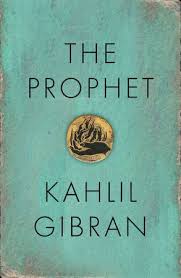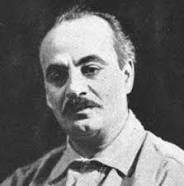The Prophet Page #8
The Prophet is a book of 26 prose poetry fables written in English by the Lebanese-American poet and writer Kahlil Gibran. It was originally published in 1923 by Alfred A. Knopf. It is Gibran's best known work.
In winter say the snow-bound, “She shall come with the spring leaping upon the hills.” And in the summer heat the reapers say, “We have seen her dancing with the autumn leaves, and we saw a drift of snow in her hair.” 85All these things have you said of beauty, Yet in truth you spoke not of her but of needs unsatisfied, And beauty is not a need but an ecstasy. It is not a mouth thirsting nor an empty hand stretched forth, But rather a heart enflamed and a soul enchanted. It is not the image you would see nor the song you would hear, But rather an image you see though you close your eyes and a song you hear though you shut your ears. It is not the sap within the furrowed bark, nor a wing attached to a claw, But rather a garden for ever in bloom and a flock of angels for ever in flight. People of Orphalese, beauty is life when life unveils her holy face. But you are life and you are the veil. 86Beauty is eternity gazing at itself in a mirror. But you are eternity and you are the mirror. 87And an old priest said, Speak to us of Religion. And he said: Have I spoken this day of aught else? Is not religion all deeds and all reflection, And that which is neither deed nor reflection, but a wonder and a surprise ever springing in the soul, even while the hands hew the stone or tend the loom? Who can separate his faith from his actions, or his belief from his occupations? Who can spread his hours before him, saying, “This for God and this for myself; This for my soul, and this other for my body?” All your hours are wings that beat through space from self to self. 88He who wears his morality but as his best garment were better naked. The wind and the sun will tear no holes in his skin. And he who defines his conduct by ethics imprisons his song-bird in a cage. The freest song comes not through bars and wires. And he to whom worshipping is a window, to open but also to shut, has not yet visited the house of his soul whose windows are from dawn to dawn. Your daily life is your temple and your religion. Whenever you enter into it take with you your all. Take the plough and the forge and the mallet and the lute, The things you have fashioned in necessity or for delight. For in revery you cannot rise above your achievements nor fall lower than your failures. And take with you all men: 89For in adoration you cannot fly higher than their hopes nor humble yourself lower than their despair. And if you would know God be not therefore a solver of riddles. Rather look about you and you shall see Him playing with your children. And look into space; you shall see Him walking in the cloud, outstretching His arms in the lightning and descending in rain. You shall see Him smiling in flowers, then rising and waving His hands in trees. 90Then Almitra spoke, saying, We would ask now of Death. And he said: You would know the secret of death. But how shall you find it unless you seek it in the heart of life? The owl whose night-bound eyes are blind unto the day cannot unveil the mystery of light. If you would indeed behold the spirit of death, open your heart wide unto the body of life. For life and death are one, even as the river and the sea are one. In the depth of your hopes and desires lies your silent knowledge of the beyond; And like seeds dreaming beneath the snow your heart dreams of spring. Trust the dreams, for in them is hidden the gate to eternity. 91Your fear of death is but the trembling of the shepherd when he stands before the king whose hand is to be laid upon him in honour. Is the shepherd not joyful beneath his trembling, that he shall wear the mark of the king? Yet is he not more mindful of his trembling? For what is it to die but to stand naked in the wind and to melt into the sun? And what is it to cease breathing, but to free the breath from its restless tides, that it may rise and expand and seek God unencumbered? Only when you drink from the river of silence shall you indeed sing. And when you have reached the mountain top, then you shall begin to climb. And when the earth shall claim your limbs, then shall you truly dance. 92And now it was evening. And Almitra the seeress said, Blessed be this day and this place and your spirit that has spoken. And he answered, Was it I who spoke? Was I not also a listener? Then he descended the steps of the Temple and all the people followed him. And he reached his ship and stood upon the deck. And facing the people again, he raised his voice and said: People of Orphalese, the wind bids me leave you. Less hasty am I than the wind, yet I must go. We wanderers, ever seeking the lonelier way, begin no day where we have ended another day; and no sunrise finds us where sunset left us. 93Even while the earth sleeps we travel. We are the seeds of the tenacious plant, and it is in our ripeness and our fullness of heart that we are given to the wind and are scattered. Brief were my days among you, and briefer still the words I have spoken. But should my voice fade in your ears, and my love vanish in your memory, then I will come again, And with a richer heart and lips more yielding to the spirit will I speak. Yea, I shall return with the tide, And though death may hide me, and the greater silence enfold me, yet again will I seek your understanding. And not in vain will I seek. If aught I have said is truth, that truth shall reveal itself in a clearer voice, and in words more kin to your thoughts. I go with the wind, people of Orphalese, but not down into emptiness; 94And if this day is not a fulfilment of your needs and my love, then let it be a promise till another day. Man’s needs change, but not his love, nor his desire that his love should satisfy his needs. Know therefore, that from the greater silence I shall return. The mist that drifts away at dawn, leaving but dew in the fields, shall rise and gather into a cloud and then fall down in rain. And not unlike the mist have I been. In the stillness of the night I have walked in your streets, and my spirit has entered your houses, And your heart-beats were in my heart, and your breath was upon my face, and I knew you all. Ay, I knew your joy and your pain, and in your sleep your dreams were my dreams. And oftentimes I was among you a lake among the mountains. I mirrored the summits in you and the 95bending slopes, and even the passing flocks of your thoughts and your desires. And to my silence came the laughter of your children in streams, and the longing of your youths in rivers. And when they reached my depth the streams and the rivers ceased not yet to sing. 0119 But sweeter still than laughter and greater than longing came to me. It was the boundless in you; The vast man in whom you are all but cells and sinews; He in whose chant all your singing is but a soundless throbbing. It is in the vast man that you are vast,
Translation
Translate and read this book in other languages:
Select another language:
- - Select -
- 简体中文 (Chinese - Simplified)
- 繁體中文 (Chinese - Traditional)
- Español (Spanish)
- Esperanto (Esperanto)
- 日本語 (Japanese)
- Português (Portuguese)
- Deutsch (German)
- العربية (Arabic)
- Français (French)
- Русский (Russian)
- ಕನ್ನಡ (Kannada)
- 한국어 (Korean)
- עברית (Hebrew)
- Gaeilge (Irish)
- Українська (Ukrainian)
- اردو (Urdu)
- Magyar (Hungarian)
- मानक हिन्दी (Hindi)
- Indonesia (Indonesian)
- Italiano (Italian)
- தமிழ் (Tamil)
- Türkçe (Turkish)
- తెలుగు (Telugu)
- ภาษาไทย (Thai)
- Tiếng Việt (Vietnamese)
- Čeština (Czech)
- Polski (Polish)
- Bahasa Indonesia (Indonesian)
- Românește (Romanian)
- Nederlands (Dutch)
- Ελληνικά (Greek)
- Latinum (Latin)
- Svenska (Swedish)
- Dansk (Danish)
- Suomi (Finnish)
- فارسی (Persian)
- ייִדיש (Yiddish)
- հայերեն (Armenian)
- Norsk (Norwegian)
- English (English)
Citation
Use the citation below to add this book to your bibliography:
Style:MLAChicagoAPA
"The Prophet Books." Literature.com. STANDS4 LLC, 2025. Web. 22 Jan. 2025. <https://www.literature.com/book/the_prophet_240>.




Discuss this The Prophet book with the community:
Report Comment
We're doing our best to make sure our content is useful, accurate and safe.
If by any chance you spot an inappropriate comment while navigating through our website please use this form to let us know, and we'll take care of it shortly.
Attachment
You need to be logged in to favorite.
Log In